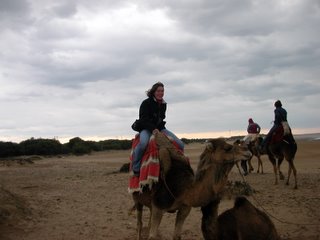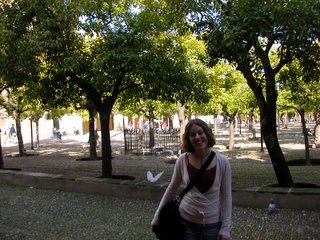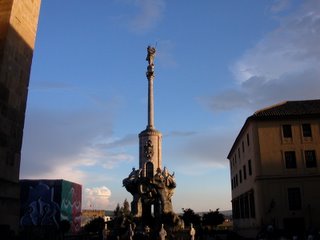I signed up to volunteer at a comedor social this week, getting up at 9 on Saturday, but doubting it would really happen as I followed a pencil “x” on my internal map to its supposed location. It was there as promised, the only comedor social in Triana on c/ Pages del Corro, and I was on time. Still doubting it would happen, I walked in and somehow got myself through the front line nun and inside to another nun who, as I expected, didn’t really know what we were supposed to do. No matter, she put us to work sorting, folding, and organizing clothing donations, grateful for our opinions on whether or not certain items were “mono” (literally, monkey, but colloquially, cute or fashionable).
At lunch time we got shepherded to the soup kitchen, which was serving fried fish (the same type my señora feeds me with bones and skin still intact), bean soup, salad, chorizo, bread, and oranges. A far cry from the pig hearts and greasy cream of wheat the San Diego soup kitchen serves, I must say. The building even, which was meticulously clean, decorated with Sevillian white-and-blue tiles, and surprisingly high-security, was much nicer than St. Vincent de Paul. Even though I only helped with the dishes and listened and nodded to a lot of Spanish, it was really quite a brilliant way to spend a Saturday morning. Indeed, people without food from any country look the same, and it seems like the comedor needs the help feeding algunos de los pobres de Sevilla.
Before I lived in a hotel, I used to walk down the tunnel that is c/ Republica Argentina because of metro construction twice a day, sometimes more. Even though Los Remedios is one of the richer areas of town, along this route I would see the same homeless people every day. There’s the man in black with scraggly dirty blond hair who camps out between McDonald’s and Vips with an electric guitar, a big green hulk hand, and two amazingly obedient dogs. Sometimes his friend, a slightly more transient fellow with long black hair and a beard, a hat, and a puffy white jacket, joins him with a couple liters of Cruzcampo. Then there’s the woman who sits right in front of the door of Plus Superdescuento holding a sign written in bad Spanish. There’s a gypsy woman who wears a long black skirt and a black shawl over her head who sits in front of a bank in one of the darker stretches of the tunnel, calling out to people as they walk by to give her money. On good days there are two accordion players, one older man by Aromas Perfumería, and one younger guy with a green jacket who stands by one of the many Telebanco cajeros automaticos. And though I never see him in the morning, this list would not be complete without the skinny, timid Asian man who haunts Plaza de Cuba, Calle Betis, and surrounding areas every night of the week, his hands ironically full of fake flowers and blinking lights.
(Wednesday night addition:)
I was walking along the street today with my cell phone in one hand and my soaked umbrella in the other, lost in thought over whether I should return the call of a Spanish guy in one of my classes and risk todo el mundo and him hearing my awkward phone Spanish, or whether I should tomar un cafelito wait and risk forgetting or losing my nerve. Somewhere in my twilight zone of thought I heard, "Niña, tiene unos centavos" and vaguely saw a woman with a suitcase off to my right. I quietly replied "No," but I guess my face flickered confusion or distaste because she started yelling after me, something about how she wasn't trying to steal anything. Actually, I have no idea what exactly she said, but I got the impression at the time it was something about stealing. I felt really bad after, as I kept walking, snapped out of my deep decision-making. I didn't mean to do whatever it was I did; I wasn't really paying attention and I wasn't prepared to interact with anyone on the street. Only the Spanish boy. Who I forgot to call.
I’m (still) going to Morocco on Thursday (tomorrow).








